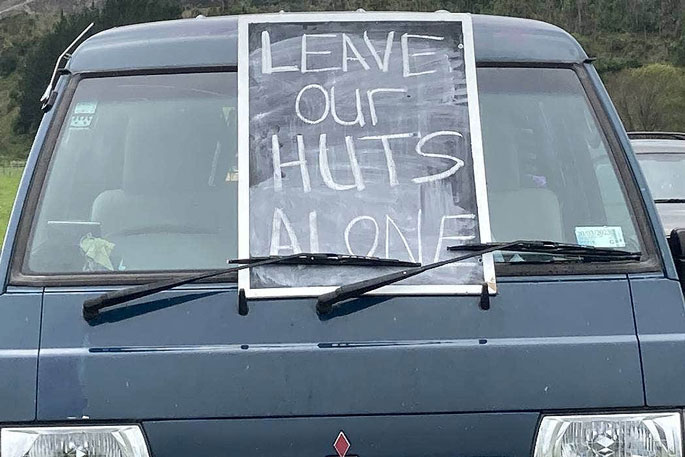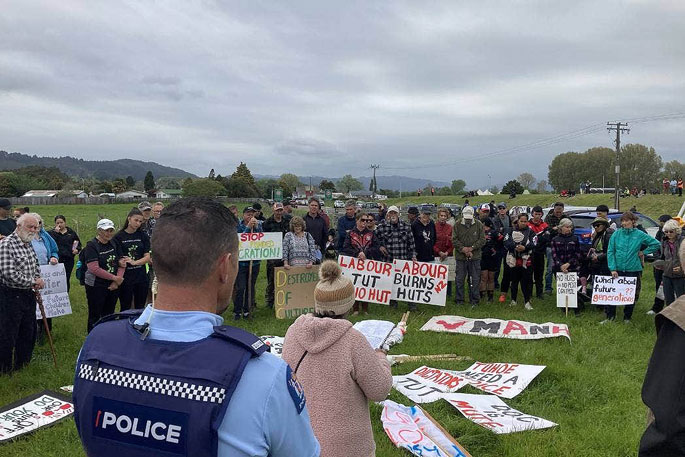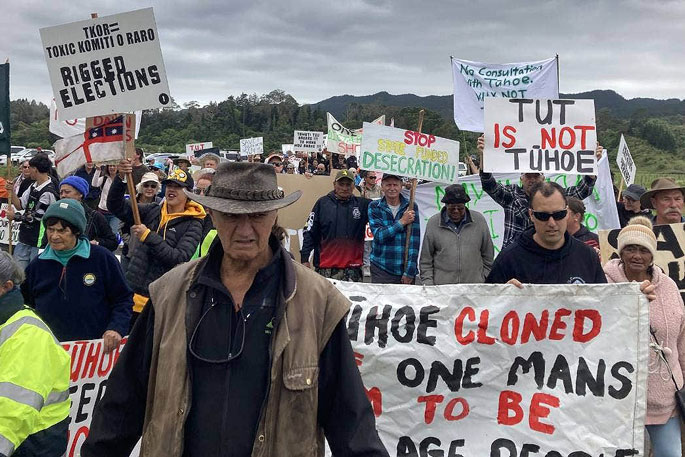Hundreds of people – led by Tūhoe kaumātua – gathered in Tāneatua on Wednesday to protest against the 'desecration” of back-country huts in Te Urewera.
Stuff revealed earlier this month that the governance entity Te Uru Taumatua (TUT) was removing 48 back-country huts, which it claimed were either near or past their end-of-life.
The plan has the full support of the Department of Conservation (DOC).
At least 15 huts have been removed, the timber burned and other materials flown out.
TUT says some huts will be replaced by bespoke, 'fit-for-purpose” structures, providing a base for workers and better access and facilities for visitors.
However, no details of the replacement buildings have been released and it's unclear how many new huts will be built.
Several hundred people, both Pākehā and Māori, gathered opposite TUT's 'living building” in Tāneatua, waving placards saying 'hands off our huts” and 'stop state-funded desecration”.
A spokesperson for the group, kaumātua Paki Nikora, says: 'We are here because of the desecration of all our huts that have all had a historical connection to Tūhoe, and also all the hunters and trampers that frequented Te Urewera over 50 years plus.
'You can't tell me a hut that sheltered our people for that long doesn't belong to Te Urewera.”
He says TUT do not represent all Tūhoe and the fact that more than 8000 people had signed a petition calling for the removals to stop, 'speaks volumes”.
He calls for a referendum on the hut removals.
Hemi Barsdell, a fomer DOC conservation services manager in Te Urewera, told the crowd it's time for people to 'make a statement.
'It's time TUT listened to us. I never thought I'd do this in my life, protesting, but I feel strongly about this,” he says.
'We've got to change the way Te Urewera is being managed. Before it went back to Tūhoe in the Treaty settlement, I was one of the biggest advocates for that and now look at me today – I'm criticising them.
'But there is still hope for a Tūhoe-led Te Urewera, it's just got to have a change of leadership and it's got to be done more collectively and together as a community.”
 A sign at the protest in Taneatua.
A sign at the protest in Taneatua.
TUT issued a brief statement in response to the protest, saying 'community members who have been actively involved in setting the vision for the evolution of Te Urewera met among the protestors to hear their enquiries and answer any questions they had about the hut removal and replacement, and the benefits for Te Urewera, Tūhoe and manuhiri (guests)”.
Barsdell says some in TUT apparently feel the huts are symbols of colonial oppression.
'We don't feel colonised by those huts,” he says. 'We're practical people, we just want the huts to stay in while we go hunting. Don't go and take them away without talking to us, that's what we're hoha (angry) about.”
A woman who says she's speaking on behalf of some possum trappers, says the huts have provided shelter for a lot of workers and hapū.
'We don't see how radical opinions can be adopted and attitudes can be taken on board where huts can be burned just because of these hurtful recollections of the past.”
A group of Tūhoe elders has written to Conservation Minister Poto Williams demanding to know why she supported the 'scorched earth policy” of dismantling most of the huts, which are owned by her department.
In an 'open letter” to Williams by a group called Te Kaunihera Kaumātua o Tu Hoe (TKKoT), claiming to represent 200 Tūhoe kaumātua (elders) said TUT and Te Urewera Board (TUB) 'do not represent the best interests of all Tūhoe kaumātua” and pointed out that several hapū had pulled out of TUT.
 Police kept an eye on the protest.
Police kept an eye on the protest.
'All we have heard is they want all DOC huts gone, because according to them, they're a colonised construct on our landscape,” the letter says. 'This is the ‘scorched earth policy' being repeated ... by a minority of our people, with your blessing.”
The letter continued: 'So, when the huts are gone, and we don't want any more colonial influences, that only leaves us one option and that is for us revert to living in tree trunks and caves in Te Urewera.”
The group wants to know what consultation the minister has conducted with Tūhoe, and whether alternative options have been put to whānau and hapū.
'Doesn't it make sense that alternatives be presented to all interested parties ... and replacement options given, before anything is destroyed?”
The group also raises potential safety risks, saying there will be no shelters in emergencies and extreme weather events.
'Are you, minister, prepared to accept all responsibility ... when all huts are removed and there's no shelter in the likelihood of emergencies, search and rescue, extreme weather events?”
A TUT spokesperson says the group's letter 'seems to be more about their internal political views than about Te Urewera” and claims the hut replacement has a 'high level of support” from the various Tūhoe tribal authorities.
'The Waimana tribal authority, for example, wanted three huts in that rohe to be retained for the time being, which is being done.”
In the letter, TKKoT also expressed frustration at what had happened since Tūhoe signed a Treaty settlement with the Crown, which involved giving Te Urewera personhood status, governed by a board made up of Tūhoe and Crown representatives.
A Te Urewera service management plan between the iwi and Crown had only served to 'marginalise” Tūhoe people, the group says.
'Since signing this agreement, separatism is getting worse,” the letter says. 'The Crown has been using taxpayers dollars to support a dysfunctional leadership for Te Urewera that denies the public and our Tūhoe people's public access.”
The letter authors also raised concerns about a lack of predator control in Te Urewera, saying since settlement, Te Urewera has become a 'breeding factory for rats, stoats, possums, deer, cows and horses, which are also infiltrating adjoining private lands”.
Williams says, in a statement that after the Treaty settlement, DOC continued to own huts and other structures in Te Urewera, but do not control or manage them.
Under The Te Urewera Act, these assets 'may be used, occupied, accessed, maintained, removed, or demolished by TUT or the Department in a manner that is consistent with the management plan and the annual operational plan for Te Urewera”, she says.
The board has a vision for Te Urewera that includes replacement of some huts with a network of new purpose-built huts and overnight shelters.
'The new facilities will be suitable for recreational activities as well as serving as bases for Tūhoe kaimahi doing conservation work.”



4 comments
No Harm Doing This . . .
Posted on 27-10-2022 08:40 | By Yadick
I do not see any harm in pulling down old huts and replacing with new ones fit for purpose however if it is a hut not to be replaced then I agree - hands off. That unreplaced hut that gets pulled down just might be a future shelter (mostly regardless of condition) that saves a life. However, at the end of the day TUT and DOC are quite within their rights to proceed but some common courtesy would go a long way.
Things to come
Posted on 27-10-2022 16:41 | By Kancho
This is an example perhaps of the Tuhoe Trust who manages the forest being an elite group and maybe what will happen more when co governance comes and elite who have absolute power and authority that can't be challenged .
Get ready
Posted on 27-10-2022 18:47 | By Slim Shady
In a few years when a wonky hut falls on someone’s head it will be DOCs fault for not removing it.
Replacement huts......
Posted on 27-10-2022 21:14 | By groutby
....aren't going to be built are they?...there is an ongoing unresolved issue on Crown Land (DOC) which crown appointed Minister Williams is not prepared to settle. Another problem left for the future government because of incompetency.............
Leave a Comment
You must be logged in to make a comment.